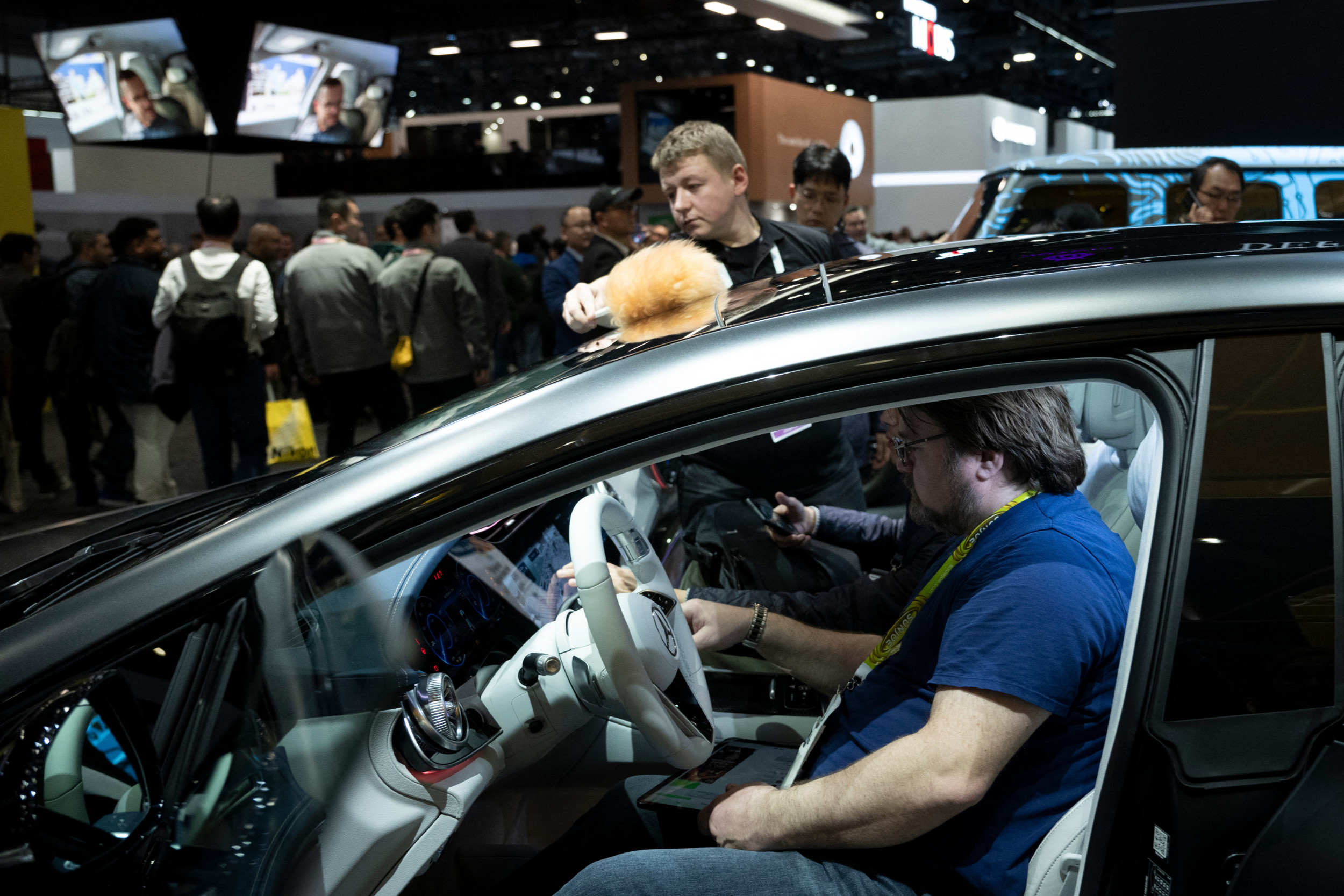But as things stand, cars are still really expensive for many Americans. Just 10 percent of new car listings are currently priced below $30,000, according to CoPilot. Things are not much better in the used car market, where only 28 percent of listings are currently priced below $20,000.
According to an October report by Market Watch, Americans needed an annual income of at least $100,000 to afford a car, at least if they’re following standard budgeting advice, which says you shouldn’t spend more than 10 percent of your monthly income on car-related expenses.
That means that more than 60 percent of American households currently cannot afford to buy a new car, based on Census data. For individuals, the numbers are even worse, with 82 percent of people below the $100,000 line.
$100k to afford a car! Wtf.
And yet, you must own one lest you be considered a pariah most places
Hate this shit
And to be fair that’s not just a weird social stigma that’s only developed because of classism, it’s a social stigma that developed because you need a car to get anywhere
deleted by creator
Sure there’s walkable cities but whoa mama rent is expensive…but this totally doesn’t say anything about how popular walkability is, and that if Americans could live in walkable areas they would…no way.
Fr. I’ve had a car for several years now, but I still get angry over how often I was given shit or denied [low-paying] jobs because I would bike or bus to the place a couple miles away. Part of what keeps me angry is probably knowing people with disabilities denied work or how friends of mine have gotten fucked by our shitty bus system, which is still one of the better ones in the US, mind you.
Protectionist policies barring Chinese cars from being imported has to be the main factor
That and the ballooning of SUVs and elimination of small cars.
deleted by creator
Same. Which doesn’t make sense because a majority of this city is mostly flat urban landscape, narrow streets that were mainly laid out in the 1910s when horses and streetcars were still the primary modes of travel, and the only “offroad” area suitable for these vehicles is a metropark that is in the jurisdiction of county rangers anyway.
cop cars have to grow in size because it’s difficult to PIT a Suburban with a Fiesta
And making every car “smart.” My app fails or my key fab battery gets to cold and I can’t start my car. It’s so fucking stupid, but I had to lease a new car instead of buying a used one because it’s a smaller down payment and I was technically unemployed, but needed a car for the job I was starting.
I hate America
I think it’s just more of the rot. Americans couldn’t ever really afford cars to the extent that they were used, no society can. And I don’t mean this on a moral ground or whatever, just economically it is a terrible, terrible system to uphold and only ever functioned due to absolutely gargantuan subsidies at every point
But, you know, that works for a while if your average consumer gets a nice treat, but it’s simply unsustainable
yeah I looked into importing a Chinese EV and it involves paying a tariff of something like 27.5% plus a bunch of other fees
I spend more than 10% of my monthly income just on fucking gasoline
America is hands down the shittiest place on earth to live. First they squeezed everybody out to 2+ hour commutes with unsustainable urban rents; then they raised the price of the cars to make those mandatory commutes; now they’re raising the rents on the suburban and exurban shitholes people got forced into. Nowhere to live, no way to get around.
America is hands down the shittiest place on earth to live.
Gaza, right now
ok, fair, shittiest place on earth excluding American proxy open air concentration camps
Shittiest place that isn’t imperialized, maybe
America is hands down the shittiest place on earth to live
correction it is the stupidest place on earth to live
America is hands down the shittiest place on earth to live.
Lacks a little perspective
I live in Colombia. I’d rather be the poorest person in Colombia than working a regular job in the States, at least here I could go to a doctor
(in the US) A doctor referred me for a brain MRI last week. I live in one of the largest cities in the country, but the doctor was 2.5 hours away. I have no idea when the MRI will be scheduled, if ever.
good, sensible system
Will this lead to more transit investment or will it lead to a tax credit that can be used on a low-interest 30-year car loan for entrepreneurs of color in opportunity zones?
deleted by creator
deleted by creator
You joke but some places already offer 96 month notes
There actually is more transit investment in the US than there’s been in a long time but it’s about 5% of what it should be. The other 95% is tax credits.
Also, one of those “transit” investments is that stupid Vegas Tesla tunnel.
More transit investment for less transit results. The consultants are getting paid but nothing is getting built.
There’s a lot that can be said about the Biden adm. but one good thing is there is actually a push to expand passenger rail, which no other adm. has done in a very long time.
Its not enough, but it’s better than it has been in the past.
Watch all of that funding go nowhere as the projects overrun like crazy and get cancelled.
Obama pushed for the same and fucking nothing got built. I s2g if you mention CAHSR…
Sure, but this is more than just pushing for it. It’s actual money being invested. That isn’t to say it’ll actually get anything done, but it is a small step in the right direction. There’s plenty of things to complain about, but the few good things should be celebrated as well.
Obama also got tons of money appropriated for rail. Here’s a sympathetic write-up from 2014: https://time.com/3100248/high-speed-rail-barack-obama/
Headline projects were CAHSR, Florida HSR, and Wisconsin HSR. Republican governors sent the money back in Wisconsin and Florida, and that got sent to CAHSR and Acela, mostly.
Some lowlights from projects mentioned in the article:
- “it’s bringing trains to the Illinois towns of Geneseo and Moline for the first time since 1978” - still no train despite at least $400m in federal funding
- “By 2017, the program will reduce trip times from Chicago to St. Louis by nearly an hour through upgrades that will increase top speeds from 79 to 110 miles per hour” - $1.66bn in federal dollars later travel times are now half an hour shorter as of last year
- “Chicago to Detroit will get a similar boost” - 80 miles of Amtrak-owned track were improved from 79mph to 110. It’s saved about 20 minutes after over a decade.
The money got spent, but not efficiently and not on anything new. The Obama admin’s obsession with spreading the money everywhere out of some awful instinct that it would get them Republican buy-in just resulted in terrible kneecapped projects. Hell, even some of the money that went to states that wanted it (California) mostly got wasted. CAHSR is terribly designed, terribly managed, terribly constructed, and terribly expensive. It has also probably done significant damage to the American political will for HSR.
deleted by creator
Just 10% of new car listings are below $30,000
Okay this does bring up a question I’ve had for a long time: Who the fuck buys new cars? I’ve only known like 1 person in my life who bought her car new and it’s because she was a moron who wanted a fancy new mustang. Even relatively wealthy adults I know buy like 3-5 year old cars.
I’ve always questioned this. It genuinely doesn’t seem like there have ever been enough people buying new cars to keep the supply of used cars going. I don’t understand how this works.
Not to brag, but as an old software developer, I’ve bought new (compact/subcompact) cars for cash, meaning no loan. Now I live car free, but in a city almost no one can afford. There is still a PMC/middle class/labor aristocratic class, though it’s ever-shrinking.
Welcome to the world of car finance, where the tiny guardrails introduced to stop the housing market going Kerplunk again don’t even exist, and is therefore awash with subprime loans.
Who the fuck buys new cars?
people who can’t afford them
Who the fuck buys new cars?
Companies I’d imagine
As well as private leases there is a massive corporate market for company cars (at least in my country). Cars are offered as a benefit to employees and used as pool cars etc. The company leases them for 6 / 12 / 18 months then they are returned back to the lease company (often the oem themselves) and either re-leased to other individuals or sold on. It’s a huge amount of cars that have that ‘sales’ model. I think almost 80% of BMWs are leased to begin with.
I was reading about a small EV startup company (read: multi billion dollar Saudi oil diversification project) that is planning on never selling cars but instead perpetually leasing cars, and reconditioning the returned car for ‘like new’ leases of the same vehicle again and again and again.
Cars companies aren’t really a manufacturing businesses any more, they’re banks; all of their real products are financial products, loans and leases etc with a car just as the vehicle (pun slightly intended) to sell those financial services.
The only person I ever knew who bought a brand new car also “invested” a significant chunk of their life savings into youtube hustle and grindset crypto scammers
So they’re a millionaire now, right?
Remember: It’s never a loss till you sell at a loss
deleted by creator
That’s what I fucking said. I had the misfortune of riding in the thing one time. I sat in the back seat. I’m 6’2”. Mustang back seats aren’t made for people taller than maybe 5’6”.
deleted by creator
i imagine this is because mustangs are powerful, rear-wheel drive cars that are relatively affordable, allowing inexperienced drivers to purchase and drive them (and not be able to control them)
and because aggressive dorks like fancy cars
Yes correct
I think if you have a big chunk of change to put down it is the smart move long-term, but basically you have to have enough money to not worry about how expensive cars are anyways. I think most new cars get leased for a year or two before they get properly sold; I have a friend who leases a new car every two years, pays just a bit more than an actual car note, and has something nicer to drive. But he doesn’t have any path to ownership.
It used to be the case you could get a new car and take out a loan with the car company for 0-1%, or buy a used car and get a loan with the bank for 5-6%. I don’t think the car companies are offering those deals now but when they did, for the same monthly payment you could get like a $20k new car or a $13k used car. Given the risk of inheriting someone else’s mechanical problems + you don’t know how well they took care of it, in that specific case new could be the better use of money in the long run.
I’ve helped a couple friends buy a car. I usually say either go with the very low end of new cars, or buy some 15 year old Honda or Toyota that will run reliably for a while longer for like $5k
The Market Adjusts. I assume financing as well as dealerships that accept trade-ins help a lot.
deleted by creator
It’s ridiculous. 10 year old cars with 100k+ on the odometer are still like 10k
deleted by creator
 That’s okay, you can just rent them from us forever. You will own nothing and be happy.
That’s okay, you can just rent them from us forever. You will own nothing and be happy.Cars have always all been rental properties in pretty much everything but name.
debt economy
see also: houses
Fuck it, every poperty that doesn’t fit in your pocket
What are you gonna do, call the state you pay for when somebody takes your TV? Huh, sounds like you’re not owning that shit on account of not having a marauding band of mercenaries to defend it
basically, property rights are stupid, you don’t own shit anyways and that’s not even getting into asseit forfeiture or whatever
I love these deranged financial rules of thumb developed in a tiny slice of time in america that everyone is supposed to live by.
30% to housing, 10% to cars
These were made in the 70s and 80s I guess? Not only is today so different that these guidelines are fucking stupid, but even in the 70s the world was still recovering from post war boom. Prior to WW2 the economy was completely different! People didn’t save, there were widespread recessions, from nance didn’t have the stranglehold that it did moving into the 70s and 80s too.
I bet someone looked at their finances in like August 1976 and made up rules that persist to this day and are absolute fantasy
It’s not really bad advice just because it’s unrealistic advice
i think the guidelines are probably still accurate it’s just that you have to sell your firstborn child to a witch in order to live securely by them in our hellscape society
I feel like all financial advice (uttered by the deranged to make people feel guilty about not living up to their personal responsibility) is delivered as if it is mystical knowledge passed down through the ages. When in fact, economies change so often that it wasn’t even relevant 20 years before it was created, and is no longer relevant today. Like, were people using government savings plans and putting aside 10% of cheques in 1850? We’re they creating education savings plans in 1900? Heck, banks did most of the work for people in managing finances in the 1950’s - work thats now downloaded onto every individual to try to scam them through making The Wrong Choice.
Finance Capitalist Realism
Not only have cars gotten much more expensive, but the cost to finance the car has gone up dramatically.
A car that should be worth $20k now costs $35k. A few years ago that 20K would have had a 4% interest rate, now it’s closer to 8%.
People shouldn’t wonder why I drive an old car.
My car AC has been broken for like 5 years and they told me it’d betw like 1500 to fix it and “i might as well get a new car” but it’s like with what fucking money I can’t even afford that 1500
Capitalism = No Transport
deleted by creator
it comes once a week, costs 700 dollars, takes three times as long as driving, and breaks down 50% of the time
deleted by creator
I believe that you’re referring to the Communist Chinese People’s Party of Evil (CCPEE), which is extremely bad - they have built more trains than anyone in the world, but only western tourists are permitted to ride them, so that we will believe communism (bad) is good (capitalism). This, therefore, is not real socialism (good in theory) and is instead bad in practice (capitalism), due to highways. Everyone in China actually lives in abandoned apartments and rides donkeys (communist horse). This is why they have so much pollution (bad for the environment), and why they build electric vehicles to destroy American factories (white).
only western tourists are permitted to ride them
the chinese people riding the trains are paid actors
correct, but they aren’t paid - there is no money in China, except for Mr. Xi, who is the richest man in the world, which he uses to buy off everyone in China (they receive no money in this exchange)
there is no money in China
the chinese billionaires are paid actors
this process of Mx. Ping paying everyone in China (with no money) is the socialist dream (nightmare) of wealth redistribution, where the richest person gives all their money (there is no money in China) to everyone else (who is an unpaid acting intern)
the chinese billionaires are paid actors
which is further proof that CCP communism (bad) is actually capitalism (good)
I am convinced cash for clunkers will remain one of the worst impacts on the environment for ages to come. I know its better to change to electric cars but for those that cant. Buying used is the second best option to buying a new low cost ICE car.
know its better to change to electric cars but for those that cant.
Cash for Clunkers precedes being able to buy an EV by a lot, that was always just a subsidy to car manufacturers
I’ll die on this stuipid neoliberal hill, but Cash for Clunkers scrapped about 680k cars. In a year where 14 million cars were scrapped, that’s a pretty small amount.

























